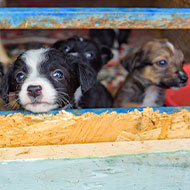RSPCA launches new strategy for animal welfare

The strategy aims to bring about an end to the illegal selling of puppies and kittens in the UK.
A new strategy for animal welfare, which aims to cut pet cruelty and neglect by 50 per cent in the next 10 years, has been launched by the RSPCA.
The strategy, which will run until 2030, also aims to bring about an end to the illegal selling of puppies and kittens in the UK and reduce the suffering of exotic pets.
Recognising the vital support and expertise of vets and veterinary nurses, the RSPCA aims to strengthen these relationships and improve communication between the charity and the veterinary profession.
RSPCA chief vet Caroline Allen said: “Vets and RVNs - both in private practice and within the RSPCA - play many critical roles; including providing veterinary care to abused animals rescued by the RSPCA, supporting our animal centres and our prosecution work, as well as reporting abused and neglected animals to us.
“We know that vets and RVNs want to have a better understanding of what they can expect from us, and we will provide more clarity around what we are asking of vets when they treat our animals. We will continue to draw on and support the strong and growing evidence base in the profession in areas such as shelter medicine, veterinary forensics, clinical behaviour and accessible care.”
She added: “We know that the veterinary sector has had a tough year, and we are very grateful for your continuing support of our work during the many challenges of the pandemic.”
The RSPCA has also announced it is exploring the transfer of its animal welfare prosecuting role to the Crown prosecution Service (CPS) to focus on its frontline work.
RSPCA chief executive Chris Sherwood said: “We are proud of our history bringing animal abusers to justice and for many years we have been the right people to do this vital work. However, the world has changed, and we have to change with it.
“We launched our new strategy this week, and a key part of this is working in partnership with other organisations with the responsibility and expertise to support our work.
“The CPS is the statutory body with responsibility for taking prosecutions in England and Wales and by working more closely in partnership with them, we can free up resources to focus on our unique frontline investigation, rescue and care work, where we can make the most difference to animals.
“However, we reserve the right to take a prosecution in future if we feel that justice is not being done for animals.”



 The latest
The latest